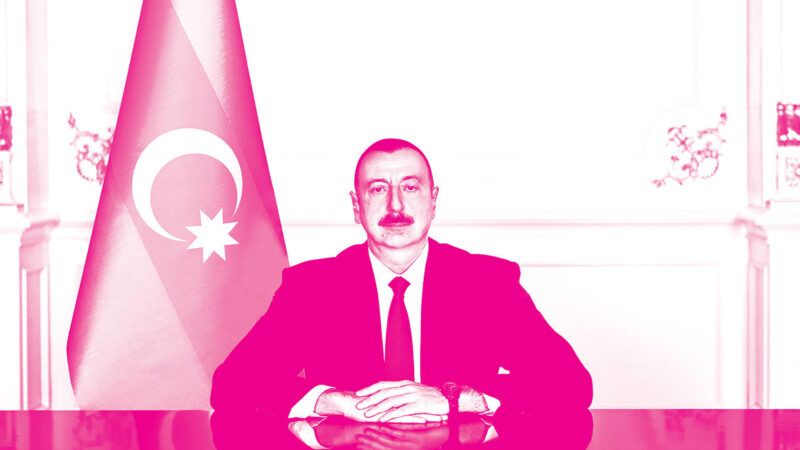Meet the New Boss in Azerbaijan
A look at Azerbaijan’s rampant corruption, unfair elections, and flimsy institutions

Reason's December special issue marks the 30th anniversary of the collapse of the Soviet Union. This story is part of our exploration of the global legacy of that evil empire, and our effort to be certain that the dire consequences of communism are not forgotten.
During its two years of independence before it was absorbed by the Soviet Union in 1920, Azerbaijan distinguished itself as the first Muslim-majority state with a parliamentary government and equal political rights for women. After Azerbaijan broke away from the Soviet Union in 1991, it initially looked like it might reprise its brief history as a liberal democracy.
That promising start also came to a swift end. A 1993 military coup installed as president Heydar Aliyev, the former leader of Soviet Azerbaijan, and the country has not had a fair and free election since then. Today, Azerbaijan—which is essentially an autocracy controlled by Ilham Aliyev, Heydar's son, and his extended family—retains the forms of constitutional government without the substance.
Freedom House classifies Azerbaijan as decidedly "not free," giving the country two out of 40 points for political rights and eight out of 60 points for civil rights in its 2021 survey. "Corruption is rampant, and the formal political opposition has been weakened by years of persecution," the report notes. "The authorities have carried out an extensive crackdown on civil liberties in recent years, leaving little room for independent expression or activism."
International observers note that opposition candidates need the government's permission to hold rallies or appear on television and that political interference prevents courts from properly investigating electoral irregularities. Aliyev won a fourth term in 2018, when he supposedly received 86 percent of the vote. The main opposition parties boycotted the election because they did not want to validate a process they viewed as fundamentally unfair and corrupt.
Journalists in Azerbaijan frequently face harassment, including arrest and imprisonment on trumped-up charges. The government unilaterally blocks websites it considers a threat to public order or national security, and the COVID-19 pandemic provided another excuse for widespread censorship.
Religious activity is tightly controlled by the state, which is especially hostile toward Jehovah's Witnesses and independent Muslim groups. Warrantless surveillance of telephone calls and online communication is commonplace. Freedom of assembly is limited to gatherings deemed consistent with "public order and morals," and the government restricts travel.
Freedom House describes Azerbaijan's judiciary as "corrupt and subservient to the executive." Due process guarantees, including the right to counsel and protections against arbitrary arrest and torture, are routinely violated, especially in cases involving activists and journalists.
These repressive practices are inconsistent with Azerbaijan's constitution, which shows promises on paper are worth nothing without the institutions required to enforce them. Lacking those institutions, Azerbaijan has replaced one set of dictators with another.


Show Comments (26)